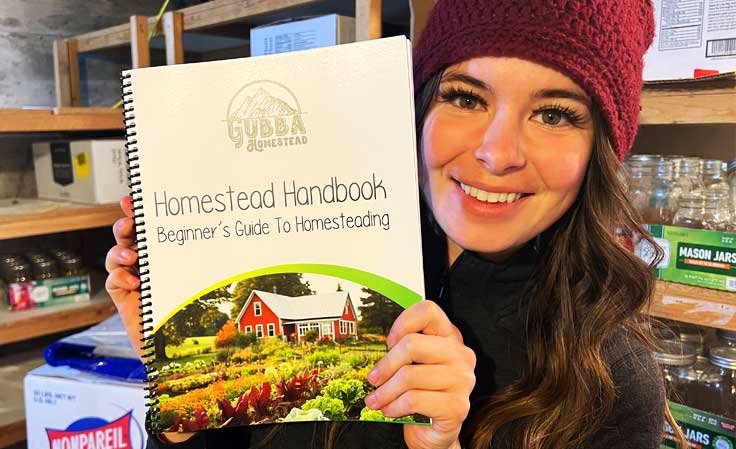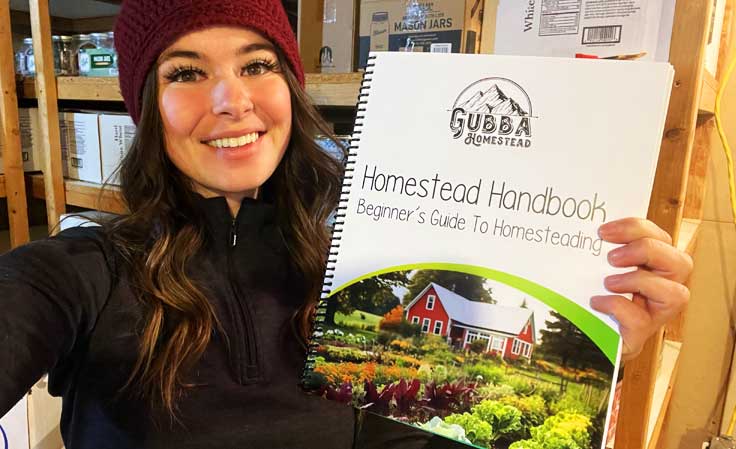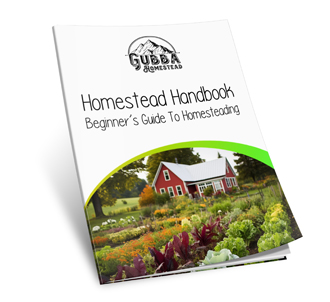In an increasingly uncertain world, where fears of world wars, food shortages, and an unstable economy loom on the horizon, the concept of urban homesteading has emerged as a beacon of hope and resilience.
I share bits of my homesteading journey online, and I am thrilled when I receive comments from people saying they are also learning the self-sufficient ways of our great-grandparents.
Truly, it only took two generations for this homesteading knowledge to dwindle and dissipate from family lineage. There is an abundance of wisdom in how our great-grandparents lived.
It is almost as if we were made to be dependent on an unreliable system, no more!
A misconception about homesteading is that you need land to do it, you don’t. You can homestead from anywhere and on any budget!
This comprehensive article will delve into the intricacies of urban homesteading, exploring its principles, benefits, and practical tips for individuals looking to embark on this ancestral journey.
What is Urban Homesteading?
Urban homesteading is a lifestyle choice that brings the simplicity and self-sufficiency of rural homesteading to the heart of the city. In the comment section of a recent video I shared online about food storage, I saw “Can I homestead from my apartment in the city?”
Naysayers were replying and saying things like “No, you need land” and “Good luck, too expensive.” Ideas like these are simply not true!
You can cultivate a deep connection with nature, even in the midst of urban landscapes, by growing food, raising animals, and embracing sustainable practices. I believe homesteading starts in the kitchen and something as simple as cooking from scratch in your kitchen can get the homesteading ball rolling.
The Benefits of Urban Homesteading
1. Food Security
One of the primary advantages of urban homesteading is the assurance of food security, a concern that has become increasingly relevant in today's world. You can build a food storage in your city-skyrise apartment by utilizing the space you have. Start slowly by stocking up on foods you eat and fill your nooks and crannies you’re your food storage.
With the specter of world conflicts and geopolitical tensions, there is a growing fear of potential disruptions in the food supply chain. By growing your own food, urban homesteaders mitigate these concerns, ensuring a reliable food source right at their doorstep. Don’t wait until the grocery stores are empty to start planning for a food alternative. Grow an herb garden in a windowsill or put a grow-bag of tomatoes on your front porch. You have options!
2. Health and Well-being
In an era marked by uncertainty, health and well-being have become paramount. Engaging in gardening and animal care promotes physical activity and mental well-being.
The act of tending to plants and animals has been linked to reduced stress levels and an overall improvement in mental health. Even just saying “hi” to animals in passing can elevate your mental well-being—it does for me! If you can’t have animals where you live, visit a neighboring farm and see how you feel.
Eating fresh, homegrown produce further contributes to a healthier lifestyle, boosting immunity and resilience in the face of health challenges. If you can’t grow your own food, seek out a local farmers market and source some produce and meat. You will notice a taste difference and be able to find local sources of food.
3. Cost Savings
In an unstable economy, every penny counts. Urban homesteading can lead to significant cost savings over time. By growing your own produce and sourcing eggs from your backyard chickens, you reduce your dependency on expensive grocery store items. I have noticed a difference especially as inflation continues to skyrocket and prices climb at the grocery store.
I am not subject to these prices as I continue to prepare my own food and supplies. This can be the case for you too.
Furthermore, sustainable practices like composting and rainwater harvesting can help lower utility bills, providing financial stability amidst economic uncertainties. Think about it, rain falls freely from the sky and having a source for water is essential to survival and food storage.
4. Environmental Stewardship
Practices like composting and rainwater harvesting reduce waste and water consumption, aligning your lifestyle with environmental sustainability. Composting allows you to utilize your kitchen scraps that would otherwise be thrown in the trash to rot. A compost will break down your kitchen scraps overtime and turn them into fertilizer for your garden or something you could potentially sell.
5. Evaluate Your Space
The first step in your urban homesteading journey is to assess the available space in your urban dwelling. Whether you have a backyard, balcony, rooftop, or just a sunny windowsill, there are creative ways to utilize every inch for sustainable practices.
Understanding your space constraints will help you plan and optimize your homesteading efforts, providing a sense of control amidst a rapidly changing world. Be sure to utilize space on the walls and under furniture to get the most bang for your buck with food storage.
It may help to draw out your living area and make a map of what you want to use the space for.
6. Container Gardening
For those with limited space, container gardening is a game-changer. Utilize pots, hanging baskets, and vertical planters to cultivate herbs, vegetables, and even dwarf fruit trees. Container gardening is versatile, allowing you to move your plants to optimize sunlight and space as needed.
It's a flexible solution for individuals concerned about the unpredictability of the future. Vertical planters are great because you can plant an abundance of food and they don’t take up much space.
7. Composting
In a world facing potential waste crises, turning kitchen waste into valuable compost is an act of responsible stewardship. Composting not only reduces the amount of household waste but also provides nutrient-rich soil for your plants.
Whether you use a small bin or a more sophisticated composting system, recycling organic matter enriches your garden and reduces the need for chemical fertilizers.
Like mentioned, you could turn making compost into a homestead money-making venture. People love to have organic matter for their garden.
8. Raising Chickens
Even in urban settings, keeping a few chickens is feasible and aligns with concerns about food security. Backyard chickens not only provide fresh eggs but also assist in pest control and contribute to a sustainable food cycle. Chicken droppings fertilize the yard.
Check local regulations and choose chicken breeds that are well-suited to your climate to ensure a steady supply of fresh eggs. If you have an HOA, make sure chickens are permitted to be kept. Chickens are seriously the best urban homestead animal because of how easy they are to take care of.
9. Rainwater Harvesting
In an era of changing weather patterns and concerns about water scarcity, harness the power of nature by collecting rainwater. Use rain barrels or cisterns to store water for your garden, reducing reliance on traditional water sources.
No more having to rush to the store for bottled water when you have your own water-harvesting system. Implementing rainwater harvesting systems is an eco-friendly way to conserve water and irrigate your plants, reducing anxieties about having water in your food storage and preparedness supplies.
10. DIY Solar Power
As energy sources remain a topic of global concern, explore the possibilities of solar energy. Install solar panels on rooftops or balconies to harness clean, renewable energy for your urban homestead. Solar power can help offset energy costs and reduce your carbon footprint, aligning perfectly with the sustainable lifestyle of urban homesteading.
One thing to keep in mind with solar power is that in a SHTF (crap hits the fan) scenario, people will be able to see that you potentially have power and that could make you a target. Keep this in mind with visible power sources.
The Importance of Community Engagement
While urban homesteading often involves individual efforts, it's equally crucial to engage with your community. Join local gardening or homesteading groups to connect with like-minded individuals.
Building a community of urban homesteaders provides support, advice, and a sense of belonging on your journey. Share surplus produce, participate in seed swaps, and collaborate on sustainability projects to foster a sense of shared purpose and camaraderie, countering feelings of isolation and uncertainty.
I have found my community to be a valuable resource. I started with sourcing raw milk from a local farmer then quickly found a small farm store that provided me with eggs and produce.
Farmers markets are a great way to meet local suppliers of items that you need or want. You can also trade skills with people. I have taught neighbors how to milk animals in trade for produce that they have grown. It is a wonderful system that I believe our great-grandparents used to engage in!
Ready to Dive In?
Are you eager to start your own urban homesteading journey, fortified with the knowledge that you can weather whatever challenges the world may bring? Learn the ropes with our comprehensive Homestead Handbook.
Whether you reside in an apartment or a house, this guide covers everything you need to get started. From choosing the right plants for your space to setting up a small-scale chicken coop, it's a valuable resource for urban homesteaders of all levels.
Purchase your copy today and take the first step toward a sustainable and fulfilling lifestyle, prepared for whatever the future holds. I understand that the thought of homesteading can be overwhelming. This guide can help you figure out where to start in your homesteading journey.
Urban homesteading is not just a trend
It’s a sustainable lifestyle choice that benefits individuals and your local communities, addressing fears of food shortages, unstable economies, and worldly conflicts. By embracing the principles of self-sufficiency, promoting well-being, and fostering community bonds, urban homesteaders can create a positive impact on their immediate surroundings and contribute to a world movement towards a more self-sufficient future.
So, roll up your sleeves, grab some seeds, and let the journey to urban homesteading begin! With the right knowledge, resources, and community support, you can transform your urban space into a thriving oasis of sustainability and self-sufficiency, regardless of the challenges that may arise.



